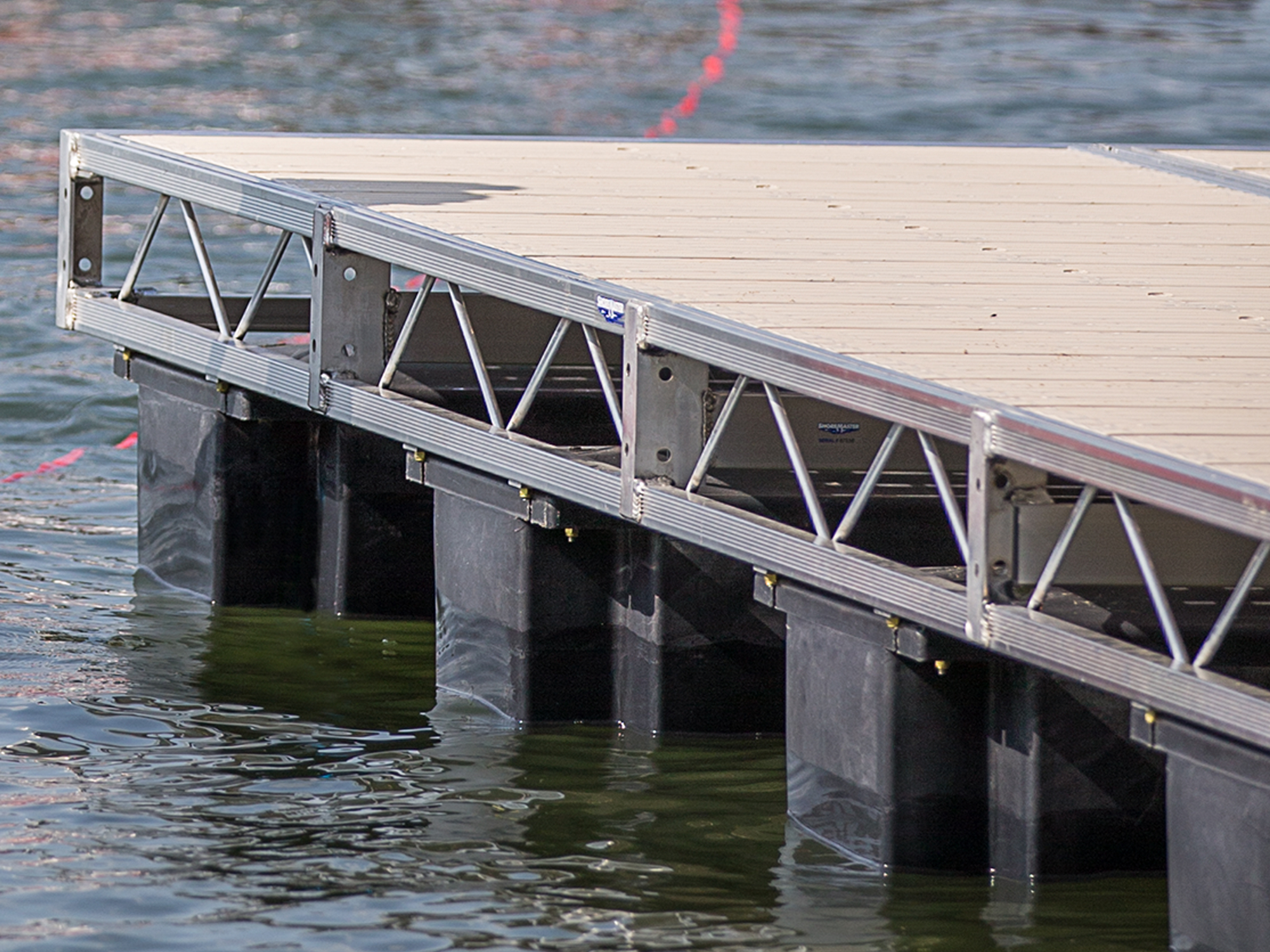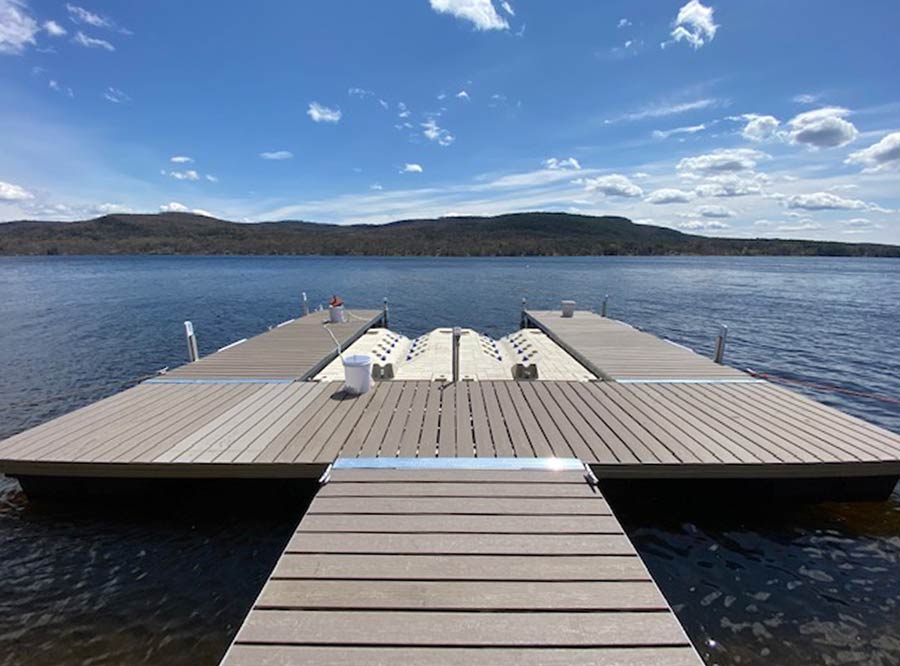Locate the Perfect Floating Dock Builder to Bring Your Beachfront Vision to Life
Locate the Perfect Floating Dock Builder to Bring Your Beachfront Vision to Life
Blog Article
Floating Docks: The Ideal Option for Versatile Water Accessibility
Floating docks present an engaging solution for a selection of water accessibility requires, providing flexibility that transcends traditional mooring alternatives. The modular nature of floating docks facilitates modification, providing to particular requirements.
Advantages of Floating Docks
Floating docks offer countless benefits that enhance water accessibility for different applications. Their ability to fall and rise with altering water levels makes them specifically helpful in environments with fluctuating trends or seasonal variations. This adaptability makes certain that vessels can quickly anchor without concern for the water's deepness, supplying a trusted system for recreational, business, and industrial usages.
In addition, floating docks are frequently created from long lasting materials that stand up to corrosion, making them ideal for lasting usage in aquatic atmospheres. Their installation is usually much less invasive than conventional set docks, reducing the environmental effect and facilitating quicker deployment (floating docks). This flexibility enables less complicated moving or reconfiguration according to user needs or environmental modifications
Safety is one more crucial benefit; floating docks can supply stable accessibility for individuals boarding or disembarking from watercrafts and decrease the risk of crashes related to unstable surfaces. They can be made to suit a range of accessories, such as cleats and fenders, enhancing capability. On the whole, floating docks represent an effective remedy for enhancing water gain access to across diverse markets while promoting safety and security and environmental sustainability.

Kinds Of Floating Docks
Numerous types of floating docks satisfy various needs and settings, each designed with certain features to enhance capability. The most typical kinds include modular docks, which include interlocking sections that permit easy modification and expansion. These docks are ideal for entertainment use, as they can be customized to fit numerous watercraft sizes and water problems.
Another prominent alternative is the fixed floating dock, which continues to be secured in place however drifts with transforming water levels. floating docks. This type is especially suited for areas with very little tidal variations, providing stable gain access to for angling or swimming. In addition, there are drive-on docks, which feature a sloped style that permits boats to easily drive on and off, making them appropriate for individual boat and smaller sized vessels
For industrial applications, durable floating docks are available, constructed from reinforced materials to stand up to substantial loads and rough marine environments. Lastly, environment-friendly floating docks use lasting products and styles to lessen environmental effect, commonly including attributes like plants to sustain regional wildlife. Recognizing the different sorts of floating docks makes sure that individuals can select one of the most proper service for their particular requirements.
Installment Process Summary
An effective setup of floating docks needs mindful preparation and attention to detail to make certain ideal efficiency and security. The initial action includes evaluating the website conditions, consisting of water depth, existing, and prospective obstacles. This analysis notifies the option of the suitable dock products and style tailored to the details atmosphere.
Following, acquiring necessary licenses is crucial, as several jurisdictions have guidelines concerning building and construction on water bodies. Once approvals are secured, the setup can continue. Begin by preparing the foundation, which visit this web-site may entail anchoring systems or pilings tailored to the dock type and neighborhood problems.
Following the structure arrangement, put together the dock sections according to manufacturer specs. Make sure that all components are safely attached and aligned to hold up against ecological anxieties. Setting the dock in the assigned location, ensuring it is level and steady.

Upkeep Tips and Ideal Practices
After the setup process is complete, ongoing upkeep plays an essential duty in making certain the durability and performance of floating docks. Normal assessments ought to be carried out to identify any kind of indications of damage, wear, or damages - dock company. Look for any loosened fittings, cracks, or splitting up in the dock sections, as these can endanger structural integrity
Cleaning up the dock is vital Continue to remove particles, algae, and other accumulation that can affect its look and safety. Make use of a gentle stress laundry occasionally to preserve sanitation without triggering damages to the surface. In addition, applying a safety sealant every few years can aid improve long life and resist ecological wear.
Take note of the mooring lines and supports, ensuring they are complimentary and secure from rust. Change any degraded parts promptly to stay clear of risks. Seasonal changes might also be required; during extreme climate condition, enhancing the dock or repositioning can avoid damages.
Applications for Floating Docks
Floating docks serve a wide variety of applications, providing to both recreational and commercial demands. In recreational settings, they offer smooth accessibility to rivers for tasks such as boating, fishing, and swimming. Their adjustable nature enables setup in differing water degrees, making certain secure and stable access despite tidal variations.
Commercially, floating docks are crucial for marinas and beachfront companies. They promote the docking of vessels, enabling reliable packing and discharging of items. Their modular design enables easy development or reconfiguration to suit transforming service needs, making them perfect for boat rentals, tour procedures, or fishing charters.
Additionally, floating docks are utilized in ecological applications such as aquatic research study and habitat remediation. They can work as systems for scientific studies, keeping track of water quality, or conducting wildlife surveys without disturbing delicate ecosystems.
In commercial contexts, floating docks are utilized in building projects, providing access to hard-to-reach areas for equipment and employees. Their adaptability, longevity, and minimal influence on the atmosphere make them an optimal choice for a variety browse around this site of applications, boosting both capability and access in different water-based settings.
Verdict
Finally, floating docks represent an ideal service for varied water access requires, owing to their flexibility, toughness, and modular design. These structures promote secure mooring for various applications while reducing environmental influence throughout setup. The reduced maintenance needs better improve their practicality. Thus, floating docks offer as a valuable property for leisure, business, and ecological projects, ensuring dependable accessibility to waterways and advertising sustainable techniques in aquatic atmospheres.
Floating docks present a compelling remedy for a range of water accessibility requires, supplying adaptability that transcends traditional mooring options.Floating docks deal countless advantages that improve water access for numerous applications. Overall, floating docks stand for an efficient option for enhancing water access across diverse sectors while promoting safety and security and ecological sustainability.
Another prominent choice is the fixed floating dock, which continues to be anchored in area but drifts with changing water levels.In final thought, floating docks represent an optimum remedy for varied water gain access to requires, owing to their adaptability, durability, and modular style.
Report this page